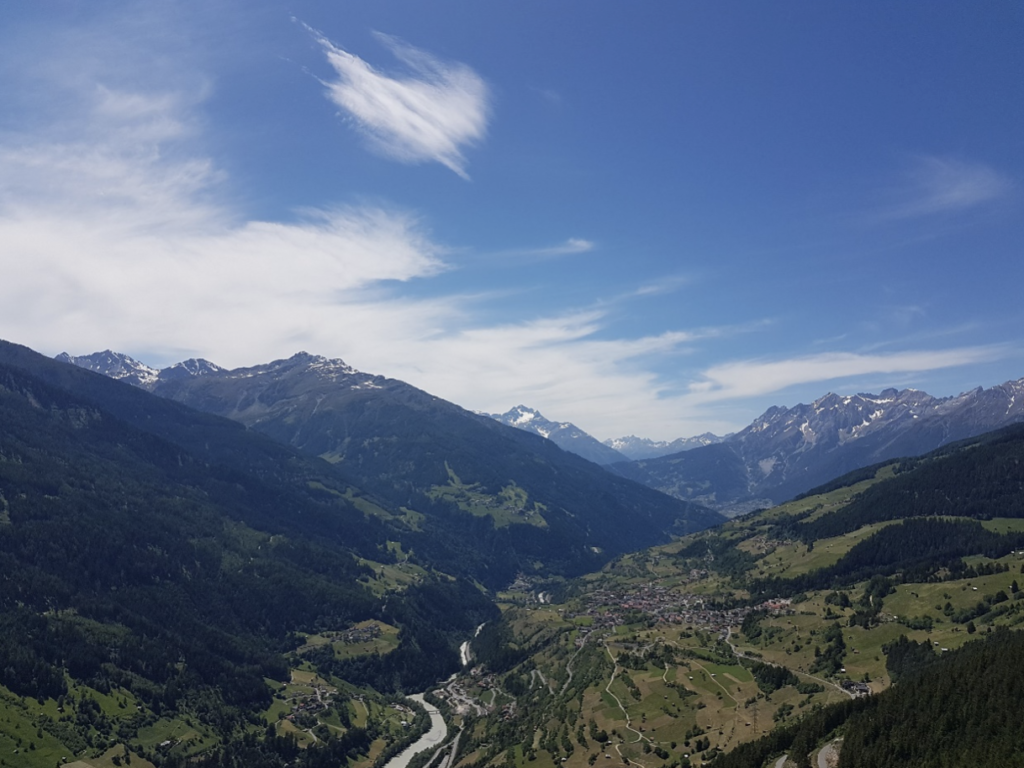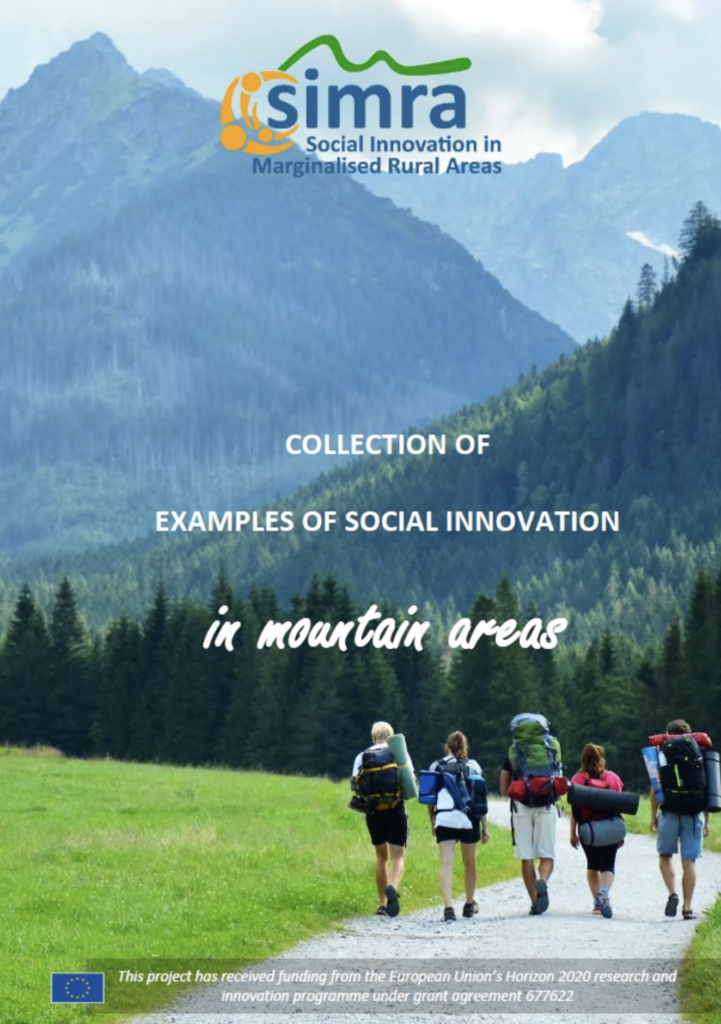By Ivana Zivojinovic and Isidora Dabic (University of Natural Resources and Life Sciences, Vienna)
The Social Innovation in Marginalised Rural Areas (SIMRA) project, funded by the European Union’s Horizon 2020 research and innovation programme, operated from 2016 to 2020. Its main objective was to deepen our understanding of social innovation and innovative governance within agriculture, forestry, and rural development sectors, with a particular focus on Europe’s marginalised rural areas as these often lack evidence of successful outcomes and necessary supporting conditions. Read on for an overview of the project, its achievements, and how MARGISTAR will use its findings to uncover further transformation pathways for European marginalised mountain regions.
Social innovation is defined by the SIMRA consortium as “the reconfiguration of social practices in response to societal challenges, seeking to improve societal well-being and involving the active engagement of civil society actors” (Polman et al., 2017). It aims to introduce new solutions to challenges faced by rural areas, especially those considered as marginalised.
Rural areas are considered marginalised within SIMRA due to various factors, including physical constraints such as mountainous or arid landscapes, limited access to essential infrastructure like road networks, electricity, and telecommunications, as well as societal marginality characterised by low incomes, high rates of poverty or social exclusion, elevated levels of infant mortality, and high proportions of early school leavers.
Why Focus on Social Innovation in Mountainous Areas?
Mountains hold a distinctive position in EU policies such as the Common Agricultural Policy and Regional Policy, as well as in global agreements like the Sustainable Development Goals and UNESCO designations. Covering 26.7% of SIMRA’s study area, mountains are vital sources of energy, water, biological, and cultural diversity. They are characterised by their altitude, terrain, roughness, slopes, low population density, and challenging accessibility, making them marginalised rural areas.

During its funding period, the SIMRA project amassed numerous case studies, many focusing specifically on marginalised mountainous rural areas. The project’s collection of social innovation examples sheds light on how communities leverage natural and social assets in mountainous regions to enhance community life, the living environment, and governance practices.
The aim of collecting these examples is to showcase the diversity of social innovations in the marginalised rural areas of Europe and Mediterranean regions. Examples that meet the below criteria are extracted from the SIMRA database and made available on SIMRA’s website:
- Evidence of reconfiguration of social practices in response to societal challenges;
- Active involvement of civil society or grassroots organisations;
- Novelty or reconfiguration taking place in new geographical settings or in relation to previously disengaged social groups;
- Improvements in societal wellbeing through social, environmental or economic aims.
These examples span from Lebanon and Italy to Portugal, Austria, Bulgaria, Albania, and Kosovo. They showcase various innovative practices aimed at improving the position of vulnerable and marginalised groups while also addressing environmental and socio-economic conditions. Many initiatives tackle infrastructure and accessibility issues or focus on enhancing the overall health and well-being of rural communities.
Some examples of SIMRA’s cases include:
- LAMO: NEW IDEAS FOR MARGINALISED MOUNTAIN AREAS (ITALY), which brought together 24 university students from different disciplines and local communities to co-design innovative proposals for the development of two marginalised mountain areas in Trentino.
- IMPROVING THE GOVERNANCE OF LEBANESE FORESTS (LEBANON), which enhanced the existing governance structure of forests through a participatory approach for their management in the Bentael Nature Reserve.
- HACK MY TOWN (ITALY), a competition organised among teams of university students challenged to provide solutions for “smart” services in the city of Glorenza.
- TEAM KARWENDEL (AUSTRIA), a volunteer platform contributing to the protection of the region and nature itself by engaging in alpine farming and habitat management in the Karwendel Alpine Park.
- ECONOMOUNTAIN (PORTUGAL), which employed a new targeted grazing technique using goats for clearing mountain pastures.
- TERRAVIVA: ECONOMIC AND ENVIRONMENTAL RESTORATION OF TERRACED LANDSCAPES (ITALY), an association of landowners using an innovative form of partnership with local public authorities to promote a sharing economy initiative and foster a collective approach to taking care of the territory.
- MOUNTAIN THERAPY FOR PEOPLE WITH DISABILITIES (ITALY), a Working Group developed to bring the benefits of mountains to people disadvantaged through physical, mental, economic, and/or family conditions.
- SUSTAINABLE MOBILITY FOR CHILDREN GOING TO SCHOOL (SLOVENIA), which organised walking buses and bike trains involving municipalities, primary schools, parents, and children.
- VOLUNTEERS TO THE RESCUE OF ISOLATED VILLAGES IN THE RHODOPE MOUNTAINS (BULGARIA), an initiative aimed at bringing social life back to small isolated villages in the Rhodope Mountains.
- A CO-OPERATIVE DRIVING TOURISM DEVELOPMENT IN PËRMET (ALBANIA), a voluntary association dedicated to developing sustainable tourism in the Përmet district.
- SKILLS FOR RURAL EMPLOYMENT (KOSOVO), an integrated approach to developing vocational skills and the local economy in the Sharr Mountains of Kosovo, aiming to reduce poverty and increase employability.
- DEL MONTE DE TABUYO MUSHROOMS (SPAIN), a small cooperative transforming mushroom production for local consumption.
These cases illustrate how social innovation can positively impact mountainous rural areas by addressing challenges and improving the well-being of communities. In its upcoming third year, MARGISTAR will surely look to the challenges and benefits experienced by those involved in these cases to develop a deeper understanding of similar transformation pathways for marginalised mountain areas.
For more information on the project and its extensive collection of social innovation cases, download the SIMRA Mountain Brochure here. An overview of other SIMRA case studies can be viewed here.

Reference
Polman, N., Slee, W., Kluvankova, T., Dijkshoorn, M., Nijnik, M., Gezik, V., Soma, K., 2017. Classification of Social Innovations for Marginalized Rural Areas, H2020-SIMRA Deliverable 2.1, p. 32. http://www.simra-h2020.eu/wp-content/uploads/2017/09/D2.1-Classification-of-SI-for-MRAs-in-the-target-region.pdf (accessed 31 October 2022).


